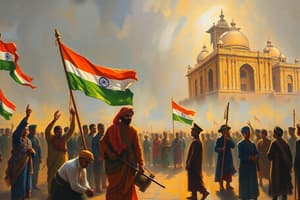Podcast
Questions and Answers
Who were some of the influential figures who championed the idea of a united, independent India in the 19th century?
Who were some of the influential figures who championed the idea of a united, independent India in the 19th century?
- Napoleon Bonaparte, Karl Marx, Martin Luther King Jr., Queen Victoria
- Mao Zedong, Vladimir Lenin, Che Guevara, Winston Churchill
- Abraham Lincoln, Nelson Mandela, Winston Churchill, Indira Gandhi
- Raja Rammohan Roy, Lokmanya Tilak, Mahatma Gandhi, Subhas Chandra Bose (correct)
Which organization became the primary platform for promoting the cause of independence in India?
Which organization became the primary platform for promoting the cause of independence in India?
- British Parliament
- United Nations
- European Union
- Indian National Congress (correct)
What characterized the focus of Indian nationalism post-independence?
What characterized the focus of Indian nationalism post-independence?
- Secularism, pluralism, and democracy (correct)
- Feudalism and anarchy
- Monarchy and dictatorship
- Totalitarianism and censorship
Which movement was known as a nonviolent protest against British colonial rule in India?
Which movement was known as a nonviolent protest against British colonial rule in India?
What was the driving force behind the struggle for freedom from British rule in India?
What was the driving force behind the struggle for freedom from British rule in India?
Which century saw the origin of Indian nationalism?
Which century saw the origin of Indian nationalism?
What is a key principle of the Indian Constitution enacted in 1950?
What is a key principle of the Indian Constitution enacted in 1950?
Which political party in India emphasizes Hindutva as a nationalist ideology?
Which political party in India emphasizes Hindutva as a nationalist ideology?
How has religious nationalism in India impacted society?
How has religious nationalism in India impacted society?
What led to the creation of Punjab, Haryana, and Himachal Pradesh in 1966?
What led to the creation of Punjab, Haryana, and Himachal Pradesh in 1966?
Which party in India champions secularism and pluralism?
Which party in India champions secularism and pluralism?
In India, what is important for understanding the country's evolution and challenges according to the text?
In India, what is important for understanding the country's evolution and challenges according to the text?
Flashcards are hidden until you start studying
Study Notes
SST: Nationalism in India
Throughout history, nationalism has played a pivotal role in shaping India's identity. In the realm of Social Studies and current events, understanding nationalism in India is crucial for appreciating the country's evolution and the challenges it faces today.
The Foundation of Indian Nationalism
Indian nationalism originated from a fusion of cultural and political sentiments, tracing its roots back to the 19th century. Influential figures such as Raja Rammohan Roy, Lokmanya Tilak, Mahatma Gandhi, and Subhas Chandra Bose championed the idea of a united, independent India. They challenged the British colonial rule, championed freedom, and promoted unity among the diverse Indian population.
The Role of Nationalism in the Independence Movement
Nationalism in India was a driving force behind the struggle for freedom from British rule. The Indian National Congress, established in 1885, became the primary platform for promoting the cause of independence. The movement gained momentum through various nonviolent and violent protests, including the Quit India Movement, the Non-Cooperation Movement, and the Civil Disobedience Movement.
The Evolution of Indian Nationalism Post-Independence
Post-Independence, Indian nationalism underwent significant transformation. The country focused on building a strong, united India, characterized by secularism, pluralism, and democracy. The Indian Constitution, enacted in 1950, embodied these principles, ensuring equal rights to all Indian citizens, regardless of their caste, religion, or gender.
Nationalism and Regionalism in India
Despite the country's diverse and vibrant culture, regional sentiments have occasionally challenged national unity. Tensions between states and regions, often rooted in linguistic, cultural, or economic disparities, have led to conflicts and separatist movements. The creation of Punjab, Haryana, and Himachal Pradesh in 1966, as well as the formation of Telangana in 2014, illustrate the complex interplay between nationalism and regionalism in India.
Nationalism and Politics in India
Indian nationalism continues to shape the country's political landscape. Political parties, such as the Bharatiya Janata Party (BJP) and the Indian National Congress (INC), have their roots in nationalist ideologies. The BJP, for instance, has highlighted its commitment to Hindutva, a culturally nationalist ideology that emphasizes Hindu identity. Conversely, the Congress Party has championed secularism and pluralism.
Nationalism and Contemporary Issues in India
While nationalism remains a powerful force in India, it has also contributed to tensions and conflicts within the country. The rise of religious nationalism, for example, has fueled communal violence and threatened the country's secular foundations. Moreover, nationalist rhetoric has been weaponized to divide society along lines of caste, religion, and ethnicity, often exacerbating tensions and conflicts.
Conclusion
Nationalism in India is a complex and multifaceted concept that has shaped the country's history, politics, and culture. Understanding nationalism in India is essential for appreciating the country's evolution and the challenges it faces today. By embracing the principles of secularism, pluralism, and democracy, the country can continue to build a united, vibrant, and inclusive India.
Studying That Suits You
Use AI to generate personalized quizzes and flashcards to suit your learning preferences.




